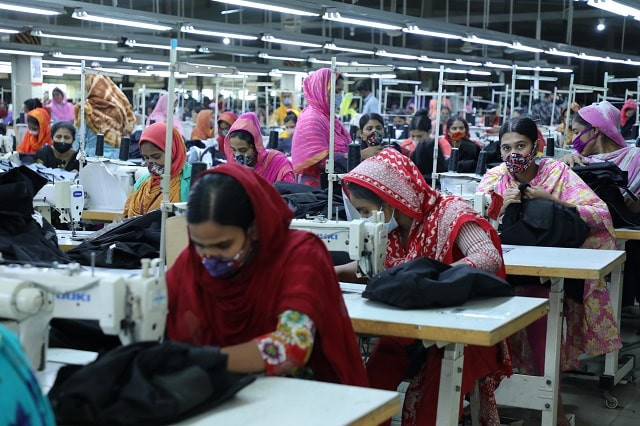Global business bigwigs launch joint financing model
Much-needed green transition of Bangladesh’s apparel industry gets a shot in the arm as a syndicate of global fashion-business bigwigs launches a joint financing model.
The Future Supplier Initiative leads the way and world’s four fashion companies join forces to support apparel suppliers with the move towards decarbonisation.
Renowned H&M Group, Gap Inc, Mango and Bestseller have committed to the initial decarbonisation programme in Bangladesh while the Initiative is actively recruiting more brands, with the intention of expanding to other key apparel-manufacturing regions like Vietnam, India, China, Italy and Turkey, according to a statement issued Thursday.
Facilitated by the Fashion Pact in partnership with Apparel Impact Institute, Guidehouse, and DBS Bank, the Future Supplier Initiative offers a collective financing model to support deep decarbonisation in the apparel sector-Bangladesh’s overwhelmingly major export earner.
The Initiative explains that with an estimated 99 per cent of total fashion-brand emissions occurring in the supply chain (Scope 3), it aims to accelerate the transition into net zero by sharing the financial risks and responsibilities of transitioning to renewable energy sources in Tier 1 and 2 garment and textile factories.
Initiative-a brand-agnostic mechanism of developing and financing projects-will support both brands and suppliers to meet their Science- Based Targets (SBTs) and stay within the 1.5-degree trajectory, adds the statement issued by H&M Group.
A combination of technical support and financial incentives will be used to help overcome the barriers that prevent many factories from adopting electrification and renewable-energy solutions.
In its first year, the cohort will prioritise factories based on impact, build technical proposals for achieving deep decarbonisation, and de-risk lending to suppliers to implement these projects at more attractive rates.
In second year, the programme will focus on project implementation and monitoring of the climate impact created through these investments.
Alongside financial incentives, technical support will be provided to help suppliers identify and implement low-carbon technologies and solutions, it says.
Baselining and monitoring emission reductions will also be conducted to demonstrate the impact of projects financed and implemented by the initiative.
It also aims to identify and match projects with the highest potential for impact. By identifying common factory units, interventions and costs, it will enable a global and regional joint effort between fashion brands, moving from targets and roadmaps to implementation and measurable reduction, beyond energy-efficiency measurements.
Eva von Alvensleben, Executive Director and Secretary-General of The Fashion Pact, said: “The cost of inaction on climate change is unaffordable. If the fashion sector is to meet its goals and transform its supply chain, we urgently need to address the gap between ambition and action.”
The Future Supplier Initiative is a unique opportunity for fashion retailers to join forces and drive progress towards science-based targets, and offer much-needed financial and technical support to apparel suppliers on their journey to decarbonisation.
“No single business alone can solve this challenge, but by sharing the costs, risks and responsibilities of the transition to renewable energy, we can build an ecosystem of solutions and kickstart a new era of change,” Eva von Alvensleben added.
Anders Holch Povlsen, Owner and CEO of Bestseller, said: “We know that as an industry, we still have many steps ahead of us, but we believe that the Future Supplier Initiative can make a positive and significant difference.”
“The Future Supplier Initiative shows that solutions are readily available and come with proven impact, but it requires commitments from brands and investors that are willing to invest,” Daniel Ervér, CEO of H&M Group, said to encourage others to join the efforts to tackle the industry’s negative climate impact.
Toni Ruiz, CEO of Mango, said: “To achieve this industry’s ambitious climate goals, it’s imperative that every stakeholder leverages their influence to drive tangible change. A joint effort among brands and retailers is essential to create conditions where suppliers are motivated and capable of making these investments.”
News Sources : thefinancialexpress






















